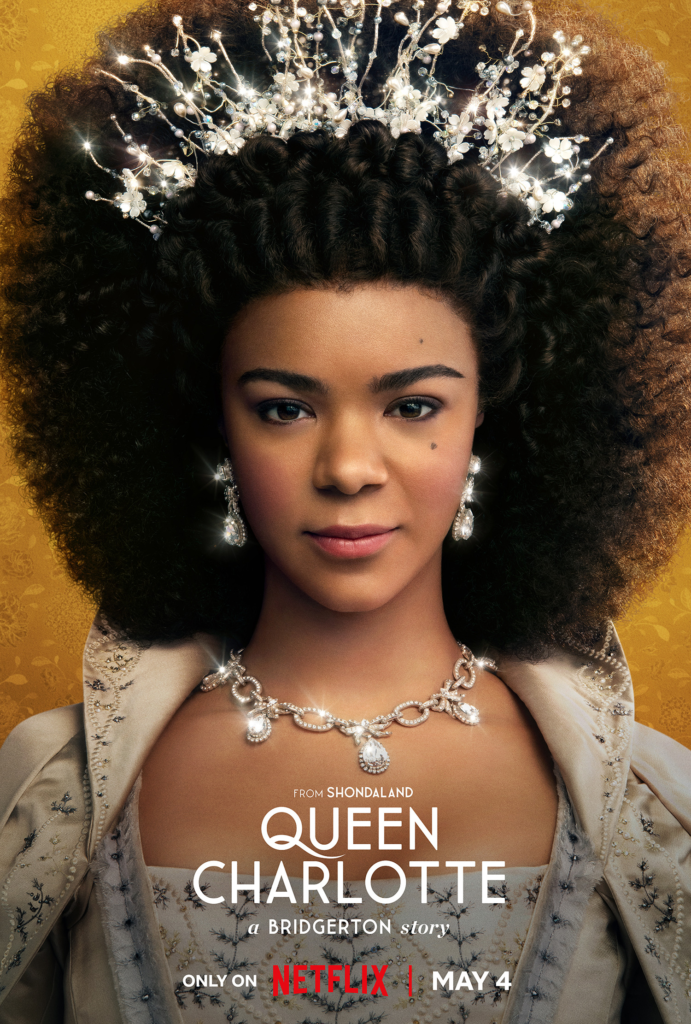Queen Charlotte: A Bridgerton Story Christian Review

“Queen Charlotte: A Bridgerton Story” is a shimmering, seductive peek into the early days of the Bridgerton universe, a universe already known for its opulence, heady romance, and whispers of scandal lurking just beneath the silk-clad surface. But if you thought the original series was all style and no substance, you might be in for a surprise. Shonda Rhimes dives into some surprising depths here, exploring a love story that is anything but straightforward.
From the outset, there’s a grandeur to the show that immediately sets it apart. Queen Charlotte, a figure introduced to us in the original series as a commanding yet somewhat aloof monarch, is given a rich backstory — one that doesn’t just fill in the gaps but redefines our understanding of the entire Bridgerton world. She’s young, spirited, and thrust into a world of courtly expectations and political alliances, all while trying to navigate a marriage to King George, whose eccentricities hint at something far more troubling beneath the surface.
A Different Kind of Love Story
Unlike many historical dramas that paint over the blemishes of royal unions, “Queen Charlotte” digs into the reality behind the glittering façade. King George isn’t just a ruler or a romantic interest; he’s a man grappling with mental illness in a time when such struggles were shrouded in shame and misunderstanding. His portrayal is compassionate, and his battle, though framed in royal splendor, feels achingly human. You can sense the heartbreak simmering just beneath Charlotte’s poised exterior as she confronts the uncertainty of loving someone who’s not always present, even when he’s physically there.
But this isn’t your typical romanticized vision of “forever and always.” The series paints a love that’s messy, painful, and undeniably complicated. Queen Charlotte’s relationship with King George feels more like a desperate clinging to something real amidst the suffocating demands of the crown. There are no easy answers, no magical cures, and certainly no false illusions of “happily ever after.” Instead, what you get is a love built on persistence and sacrifice, the kind that feels like it’s holding on by sheer willpower rather than destiny.
For a Christian audience, this depiction of commitment can strike a chord. Marriage is often idealized, even within religious communities, as a path paved with blessings. But “Queen Charlotte” is refreshingly honest about the hardships of being bound to someone struggling in profound ways. Loving someone through suffering, through brokenness — that’s a narrative that has a certain resonance for those who believe in vows that go beyond “better” and “worse.”
The Friendship Factor: A Different Kind of Romance
And it’s not just about Charlotte and George. This prequel gives space to other relationships too, ones that often get sidelined in favor of torrid romances. There’s something special about the friendships depicted here, like the way Charlotte’s handmaiden, Lady Danbury, becomes an unexpected confidante and ally. Their dynamic is less about power and more about mutual respect, something rare in the stratified world of high society. They challenge and support each other, showing that love comes in many forms — not just the kind that ends in marriage.
In fact, this series does something almost radical: it elevates platonic love to the same status as romantic love. It suggests that trust, support, and genuine connection are just as important in friendships as they are in marriages, and that the bonds formed between women — bonds forged in shared pain and triumph — can be every bit as powerful. That’s a subtle but important message, one that might resonate with Christian viewers who value community and fellowship as integral parts of life.
A Cautionary Tale: Navigating Content and Themes
That’s not to say “Queen Charlotte” is a perfect watch for Christian audiences. Like its predecessor, it’s full of sensuality, extravagance, and indulgence. The opulence on display is breathtaking — ballrooms dripping with jewels, costumes that practically radiate wealth, and a kind of visual lushness that’s more intoxicating than a glass of the finest French champagne. It’s easy to get lost in all that glitter and forget about the more insidious messages lurking underneath.
For one, there’s a tension between the show’s portrayal of power and its romanticization of luxury. Everything looks so beautiful, so grand, but there’s a dark underbelly to this world of privilege that the series sometimes glosses over. Characters flaunt their wealth, their power, and their status without much consequence. There’s an irony to a story that wants to humanize royalty but still holds the trappings of the monarchy as a kind of fantasy ideal.
As a Christian viewer, it’s worth pausing to consider what the show is really celebrating. Yes, there’s love and sacrifice — but there’s also vanity, pride, and an obsession with appearances that can feel troubling. And then there’s the matter of the explicit content. Though toned down compared to the original Bridgerton series, “Queen Charlotte” still leans into suggestive scenes that may be unsuitable for those who prefer their viewing without such elements. It’s not gratuitous, but it’s there, woven into the fabric of the narrative in a way that might be hard to simply skip over.
A Show With Layers: Emotion and Drama Beyond the Surface
But what makes “Queen Charlotte” stand out is its emotional depth. It doesn’t shy away from the pain of mental illness, nor does it offer easy resolutions. King George’s madness is a constant presence, shaping the lives of those around him. His episodes are portrayed with sensitivity, capturing the frustration and helplessness of a man trapped in his own mind. The series doesn’t villainize him, nor does it minimize his condition — a delicate balancing act that deserves recognition.
Queen Charlotte’s response, too, is layered. She’s not a saintly figure who bears her burdens with unwavering grace. She’s angry, she’s confused, and sometimes she’s utterly lost. But she stays. And that’s the heart of it all. Not the grandeur or the romance, but the staying — the decision to remain, even when everything in her world tells her to leave. There’s something profoundly Christian about that kind of love, the kind that chooses to endure even when it would be easier to walk away.
Yet, the show doesn’t sugarcoat the cost of such love. Charlotte loses pieces of herself in the process. The radiant young woman we see in the beginning is harder, colder by the end. There’s a sense of loss there, a sacrifice of self that’s quietly tragic. She becomes the queen we know from “Bridgerton,” but at what price? That’s a question the show leaves lingering in the air, unanswered and uncomfortable.
The Verdict: To Watch or Not to Watch?
So, is “Queen Charlotte” worth your time? For Christian audiences, the answer is… complicated. If you’re looking for a show that upholds traditional values without question, this isn’t it. But if you’re open to a story that wrestles with love’s complexities — that shows its beauty alongside its pain — then there’s something deeply compelling here.
Just be prepared to sift through the glitz and glamour to find it. This isn’t a straightforward love story or a morality play. It’s something more ambiguous, more human. It’s a reminder that love, real love, isn’t always about fireworks and fairy tales. Sometimes, it’s just about holding on, even when everything else is slipping away.
Final Rating: 6/10
“Queen Charlotte” is a stunning series with emotional weight and gorgeous visuals, but its content and moral ambiguities make it a mixed bag for Christian viewers. Watch it for the story, for the performances, for the unexpected moments of grace — but watch with discernment.



